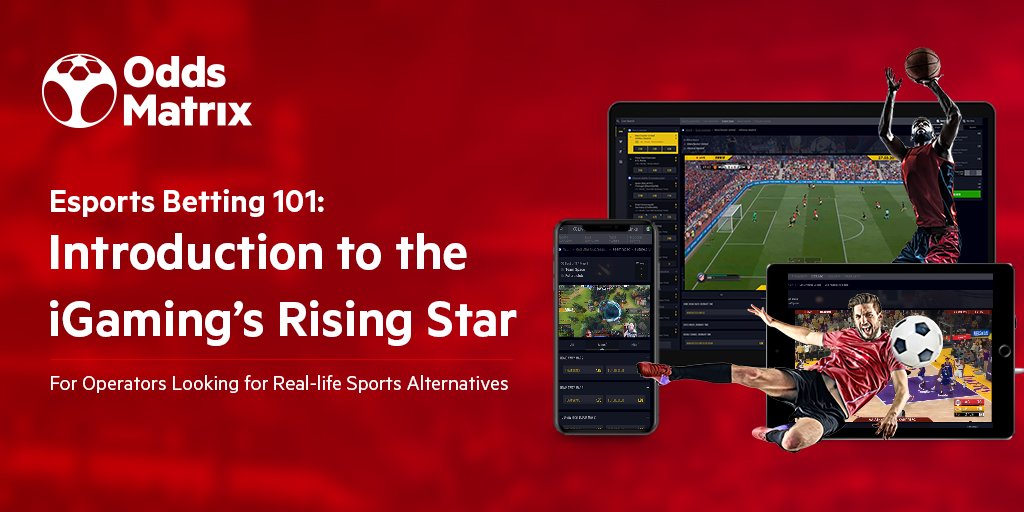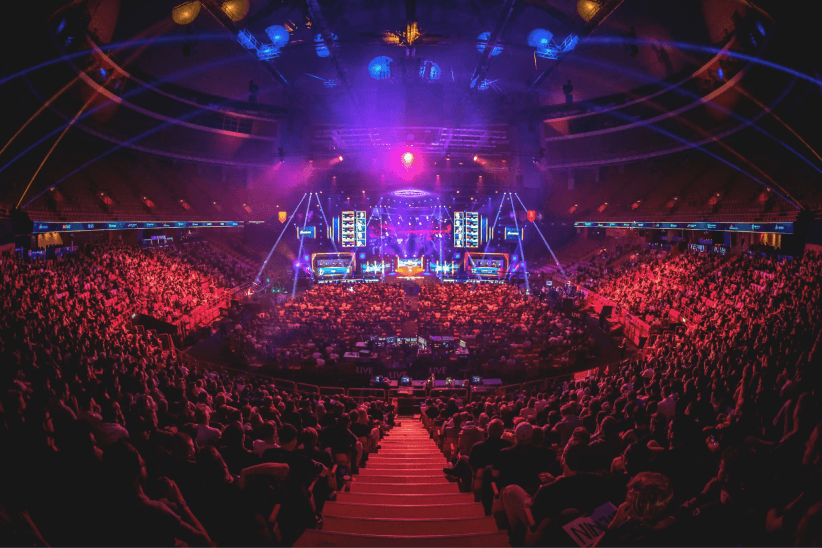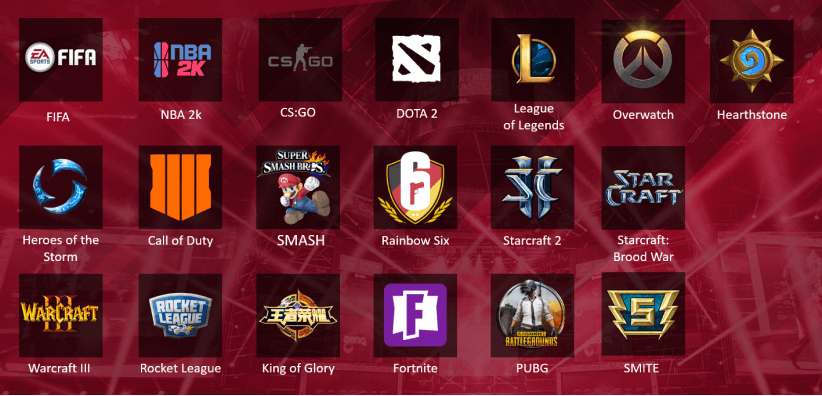Esports Betting 101: An introduction to the iGaming’s Rising Star

Throughout the 2000s, esports – or competitive video gaming – have evolved into a multibillion-dollar industry, and all predictions count on them growing even more, anticipating a total global revenue of more than 1 billion dollars in 2020. The recent coronavirus pandemic has also thrown a wild card into the game – with traditional sports events postponed until further notice, all eyes have now turned on esports to fill in the gap, giving viewers and punters new horizons.
But the esports arena is a promising one in its own right, even without such disruptive socio-economic events. Powered through the 21st century by the internet’s growth, esports skyrocketed and also reached mainstream media – for instance, in 2015, ESPN aired its first esports tournament, Blizzard’s Heroes of the Storm. By 2019, esports total audience reached an impressive 453-million viewers (a 12.3% year-over-year increase, according to the NewZoo Global Esports Market Report), 57% belonging to the APAC region.
Video gaming competitions switched from personal entertainment to a spectator sport, opening a whole new world of possibilities for the betting experience. The content is rich, and it is there for the taking: in 2019 only, there were 885 major esports events. More than that, there are advanced talks of having esports included in the official programs of several Olympic games’ events. In 2018, they were included as demonstration sports at the Asian Olympics, and they are likely to be included in the Paris 2024 Summer Olympics as well.
In these challenging times for the world of sports betting, esports come as a lifebelt: they offer a colossal amount of engaging content and betting markets, as well as a huge audience. And while the inclusion of esports as official sports is still a matter of debate, important steps are made in that direction. In this respect, esports betting is already steps ahead in the game, and operators that integrate esports in their offering will be better prepared for the future in two essential ways. On the one hand, they are exposing traditional sports punters to esports, increasing the adoption rate and preparing ahead of time for the possibility that esports are officially recognised as sports. On the other hand, there is already a huge fan base for esports, so attracting more wagers is the next step – this is a new audience, to be added on top the traditional layer.
To better understand the possibilities esports offer, let’s take a short tour through the esports universe.
A Brief History of Esports
Going back a bit to the basics, let’s see exactly what esports are, when did they begin and when did they become so popular. Simply put, esports are a form of sports competition through video games, often with professional individual players or teams.

When did esports begin?
The first official video game competition was hosted by Stanford University on the 19th of October 1972: a Spacewar contest between its students. The prize was a 1-year subscription to the Rolling Stones magazine. To put that into perspective, The International – the annual Dota 2 world championship esports tournament – had a prize pool of 34 million dollars in 2019.
Fast forward to 1980, when Atari organized the Space Invaders’ Championship, gathering 10,000 competitors in the US – the first major esports tournament, and Twin Galaxies, the first organization to keep world records in video gaming, was born. It’s also the decade when esports made it to the mainstream media, with arcade games Starcade and First Class TV shows broadcasted in the US and UK.
The 1990s meant a leap forward in esports, with their popularity on the rise due to the increased internet connectivity and a significant advancement in graphics’ quality, mixed with the increased affordability of home computers. Nintendo’s World Championships debuted in 1990, and in the same year, ID Software launched the first-person shooting genre, multiplayer video game Quake. 1997 saw the first true esports tournament – Red Annihilation (ID Software), and the first pro gamer – Dennis “Thresh” Fong.
The end of the decade saw an unprecedented rise of esports in South Korea, fuelled by the financial crisis in the country. Net-cafés appeared on the video gaming scene, offering access to an affordable form of entertainment to the country’s youth, then came sponsorships and dedicated esports TV channels, broadcasting esports to the masses.
Then came the new millennium, and the 2000s became dotted with esports milestones: the WorldWide Webgames Championship (2006) handed in a cash prize of 1 million dollars, Nintendo’s Wii Games in the summer of 2010 gathered 400,000 participants, the first annual League of Legends Championship took place in Sweden (2011), and by 2017 it gained a viewership of 60-million people. In 2011, the Twitch videogames live-streaming platform was launched, and The International (annual Dota 2 tournament) hit the scene.
But who are the esports enthusiasts?
In 2015, 54% of the crowd that cheered for esports players was aged between 21 and 35 years and included mostly high-income, full-time professionals. They are willing to spend vast amounts of money in the digital realm, so companies are racing to attract and monetize the esports audience.
For 2020, all predictions have been thrown in the air, but the signs are great for the industry as a whole. For example, live-streaming viewership has surged in March 2020, with week-to-week increases by 10% for Twitch and 15% for YouTube Gaming. It’s a big moment for esports, and the global lockdown is seeing sports fans turn to esports as a form of entertainment (especially NBA 2k, FIFA and others with real-life correspondents).
How many types of Esports are out there?
While the list of esports games genres and subgenres is huge, currently there are a few types that count the most.

Sports games (FIFA, NBA2k, and others)
One of the oldest genres in gaming history, these are videogames that recreate real-life sports. In the esports world, they are still far behind the likes of DOTA 2 or LoL, but with the 2020 freeze on real sports, they might climb the ladder fast. NBA2k for basketball and FIFA soccer series has already seen a significant increase in esports betting, partially due to the fact that traditional punters are more familiar with the rules and have a better understanding of how they impact esports odds.
And a special mention goes here: several professional athletes have already been involved for a while in esports. A number of footballers have invested their time – and money – in FIFA esports, owning teams or playing themselves. To name just a few: Arsenal’s Mesut Özil, Real Madrid’s Gareth Bale, AC Milan’s captain, Alessio Romagnoli, or Antoine Griezmann, playing for FC Barcelona and the French national team. While there’s no guarantee that a real-life player will influence odds in esports, it does add to the thrill of the game.
First-Person shooter (FPS)
The name speaks for itself – it is a video game genre that lets you experience the game through the eyes of the protagonist. For example, Counter-Strike: Global Offensive (CS:GO) is a multiplayer first-person shooter video game, and one the most popular esports games in the world.
Third-person shooter
Another type of shooter video game, but this time the character is visible on the screen. It includes the most popular game on streaming platforms, Fortnite. According to eSports, in March 2019 there were 250-million accounts registered – that’s like 75% of the US population.
Real-time strategy (RTS)
RTS is a subgenre of the strategy video games, in which players simultaneously control structures in units in order to secure areas on a map and/or destroying their opponents. This is done via gathering resources, building bases, in-game technological development and commanding units. One of the world’s best-known esports games, Warcraft III, was a real-time strategy game in the esports professional circuit.
Multiplayer online battle arena (MOBA)
It is a combination of RTS, role-playing and action games that has each player of a team controlling only one character on a map, with the objective to destroy the other team’s main unit. It is the biggest subgenre in esports, including both Dota 2 and League of Legends (LoL), two of the most popular esports games.
Fighting games
This type of esports game implies close combat between a limited number of characters. Typically, there are several matches, and the characters fight until one of them wins or the time expires. Nintendo’s timeless classic, Super Smash Bros. made quite a career in esports and was featured in several important tournaments.
Racing
Racing eSports have also seen a surge in popularity, becoming a spectator sport, with Formula One esports series and the Gran Turismo World Championships broadcasted around the world.
…and many others esports
Essentially, there are countless genres and subgenres. If we must name one, that would be World of Warcraft by Blizzard. The insanely popular massively multiplayer online role-playing game has its WoW Arena World Championship returning for the 13th year.
Same as for real-life sports, Esports tournaments are growing in audience
While they still have a long way to reach traditional sports, interesting things are happening with the likes of FIFA and NBA 2K. More and more, official governing bodies of sports start paying attention to esports and see them as a viable alternative, and they have been taking charge of tournaments and leagues for a while now.
Dota 2’s The International
Founded in 2011, the annual esports championship for Dota 2 reached an overall prize pool of $34,330,069 in 2019.
Fortnite World Cup
This annual event has had a very strong start in terms of prize pool, with $30 million available across competitions. The first edition was held in 2019, and it the finals totalled a whopping 2.3 million viewers on YouTube and Twitch, excluding China (Source: epicgames.com).
League of Legends World Championship
The annual professional LoL World Championship has teams competing for the $1 million prize, but the total pool prize was $6,450,000 dollars in 2018.
NBA2k League
Founded in 2017, this was the first esports league operated by a professional sports league from North America, namely the National Basket Association, in collaboration with Take-Two Interactive. Structured similarly to the NBA, the NBA 2K League features a regular season, playoffs and finals, and it had its inaugural season in 2018.
NBA2k Players Tournament
Created as a direct response to the 2020 COVID-19 pandemic, it’s a great example of how esports begins to offer successful alternatives to real-life events. This tournament premiered on April 3 on ESPN and it features 16 current NBA players, including Kevin Durant of the Brooklyn Nets and Trae Young of the Atlanta Hawks. Semi-finals and finals will be aired on April 11. Every player will choose eight of today’s NBA teams, each to be used once. The first two rounds will be single elimination, with the semi-finals and finals running best of three.
FIFA eWorld Cup
Established in 2004, we can already call this an esports tournament with a longstanding tradition, broadcasted on Twitch, YouTube, and even on TV (FeWC16). It is an annual tournament organized by FIFA together with EA Entertainment, and its Grand Final will welcome 32 players who qualified via the EA SPORTS™ FIFA Global Series. For the 2020 Global Series, FIFA anticipates that the 9-month competitive ecosystem will draw tens of millions of players from more than 60 countries. And they have a good reason for that: in 2019 only, the Grand Final had 47-million online views.
Esports Betting – just how big is it?
With fast-growing numbers all across the board, 2020 is about to see an audience of 495 million esports enthusiasts and reach an awareness of about 2 billion people for esports games – which is to say that more than a quarter of the Earth’s population will know something about it.
What does this say about the betting on esports? Let’s look at some numbers so far: in 2019, the industry saw a $8 billion in total wagers (according to Eilers & Krejcik Gaming), and this only with a fraction of the total fan base of esports, with estimates to exceed $20 billion in total wagers by 2020.
And this could be a conservative estimate, considering that the 2020 climate might accelerate the adoption rate of esports betting among traditional sports punters. Furthermore, the crackdown on skin gambling sites (where you could bet skins, that is virtual good or items used to decorate characters, and eventually exchange them for cash) has a strong potential of driving up cash betting.
The start of esports betting took place in the video gaming community, and in 2010 Pinnacle pioneered this sector, offering esports betting markets. Further on, several traditional sports betting sites also offered esports, while some sites were launched that focused solely on esports betting.
Generally speaking, there are a few types of esports betting, which can include:
- Real-money betting: fixed-odds
- Social betting: private, between individuals
- Skin and item betting
- Fantasy sports
There is also an abundance of betting markets, from the more general to game-specific, including:
- Outrights/futures: winner or team that makes it to another stage
- Over/under: score for the match, for the 1st half/2nd half etc.
- Handicap wagers
- Total wagers (e.g. total kills, total number of maps played)
- Correct scores
- Specials/props
- Asian handicap
With traditional sports events being cancelled across the globe in 2020, where should a traditional punter start in the esports world? A safe bet would be the equivalent of real-life sports, such as FIFA and NBA2k. In events such as FIFA eWorld Cup and NBA2k League, traditional bettors will step on known grounds, and they will be able to leverage their knowledge. It’s the ideal situation, combining the novelty of esports with the familiarity of classic sports.
Odds are on your side with OddsMatrix
Esports betting is taking a big leap now, and we are here to help. Operators are offered a massive coverage of game titles and tournaments, with more than 50,000 pre-live events and 25,000 live events as of 6th of April 2020, as well as video streaming available for over 80% of the live events and a huge range of specialised esports betting markets.
OddMatrix Esports Hosted Solution can be integrated as a new, customizable tab to swiftly establish a presence in esports betting in just 1-2 weeks. The bespoke tab can be seamlessly integrated with the operators’ wallets and player sessions.
For the regular sports bettor, it brings a familiar setting with FIFA and NBA2k as the best converting games, bringing betting markets similar with the ones in real life. For these two alone there are more than 80% out of the total live events per month which now can be offered to the classic sports audience, to keep them engaged and make sure the revenue gap gets covered. Fast.

In the short term, sports operators can take advantage of OddsMatrix rapid integration tab and market their esports offering in 2020, to make up for the loss of real-life sports events.
On the long run, this is going to pay off in multiple ways – traditional bettors will discover fun and engaging waging options, while niched esports punters will be drawn as a new audience. What is now a fallback option shows promise to become an enduring and significant revenue source.
Ready to start a conversation?
The key for us as a true B2B iGaming software provider is to help gaming operators implement bold ideas and unleash their creativity. Everything is possible.
Talk to an expert






